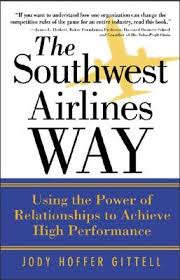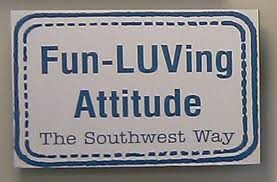Click here to return to Blog Post Intro

After 8 years of field research, Jody Hoffer Gittell published The Southwest Airlines Way in 2002—immediately after one of the most trying economic times in the airline industry following the attacks on America of September 11, 2001.
Southwest’s story proves that organizations with strong relationships can move beyond traditional trade-offs between efficiency and quality, shifting out of the efficiency/quality frontier to achieve higher levels of both. Relationships are not just “nice to have” but rather—if invested in consistently over the long run—can be powerful drivers of performance.
Gittell’s research highlights 10 organizational practices of Southwest Airlines that reinforce one another—and when bundled together— produce exceptionally high performance:
1. Lead with Credibility & Caring
Leadership created a level of honesty and trust across the company—they’ve always been committed to the principle—if it’s bad, they tell you it’s bad. And members of Southwest’s top management team make it a priority to build strong relationships with one another.
2. Invest in Frontline Leadership
Southwest Airlines has more supervisors per employee than any other airline (1 for every 10-12). Even in the 1990s when organizations across a variety of industries and government were eliminating supervisory and management positions, Southwest bucked the trend. They believe that their high levels of supervisory staffing contribute to higher relational coordination. As Libby Sartain (Southwest’s VP for People at the time) said, “We’re only as strong as our supervisors. That’s where most organizations break down. Now we are putting more time & effort into internal recruitment & training for frontline supervisors.” Companies that have reduced the number of supervisors found:
- Frontline employees receive less coaching & feedback
- Frontline employees have a less personal relationship with management
- There is less opportunity for day-to-day conversations through which to work out a set of shared objectives between management and non-management employees
3. Hire and Train for Relational Competence
Sartain notes, “We take the time to find the right people to hire, at all levels in our organization, and we spend time training them.” They look for people who are team-oriented then put them in programs like “Day in the Field” or “Walk a Mile”, where employees periodically spend a day working in another department to become familiar with other work process related to their jobs or jobs they aspire to.
4. Use Conflicts to Build Relationships
As conflict expert Karen Jehn points out, task-related conflict can improve performance when it takes place in a setting where it’s valued. A Southwest customer service agent noted, “If it’s a real conflict, we bring people together, and we don’t leave until it’s resolved.”
5. Bridge the Work/Family Divide
Sartain explains, “We are a work- and family-friendly place. We’re very flexible with scheduling. But it’s more of a flexible attitude here than formal policies. For instance, we don’t have flextime and other family programs but there is a lot of leeway for employees to trade shifts.” Work/family expert Joyce Fletcher argues, “There are organizational benefits of relaxing the boundary between work and family and/or community as a way of developing relational competence in workers.” Southwest supports employees’ family commitments by providing help in times of emergency, making flexible schedules available, and getting family members involved in the organization’s extended family “so they don’t feel left out.”
6. Create Boundary Spanners
Moving in the opposite direction of other industry leaders, Southwest increased staffing of operations agents (also known as boundary spanners). In fact, each flight had its own, and the boundary spanner builds relationships to get results.
7. Measure Performance Broadly
W. Edwards Deming (famous management consultant, known as the Father of Quality) pointed out that functional measures lead to information hiding instead of information sharing. On the other hand, cross-functional performance measures encourage participants to focus on learning and continuous improvement rather than blaming when things go wrong. As a Southwest Station Manager notes, “My director will look at overtime costs and on-time performance. But the biggest thing he’ll look at is morale. He believes that morale affects the other things. If you are not treating people right, the other things will get you.”

8. Keep Jobs Flexible at the Boundaries
Rigid, well-defined jobs are no longer necessary or useful in many organizations. Instead, flexible job boundaries help build stronger relationships between functions, improving coordination between them.
9. Make Unions Your Partners
Southwest is one of the most highly unionized companies in the United States. Most labor disputes are more about respect than anything else. Southwest notes, “This is one reason our supervisors are so important. It’s easier to walk out on people who don’t give you respect than to walk out on a friend.” Respectful relationships between union & management set the tone at Southwest Airlines.
10. Build Relationships with Suppliers
Jim Wimberly, VP of Operations at Southwest, says, “When we go into a city, we create orders-of-magnitude growth, not incremental, so we have to work closely with the airport or it won’t work.” The Director of New Hampshire Airport reports, “Southwest makes the airport part of their team… That’s unheard of… It makes me want to bend over backwards.” And Southwest recognizes a key principle—if you don’t have strong relationships internally, it’s much harder to extend them to encompass your key suppliers.

May you learn some of the lessons from The Southwest Airlines Way, as you shoot for the stars!
